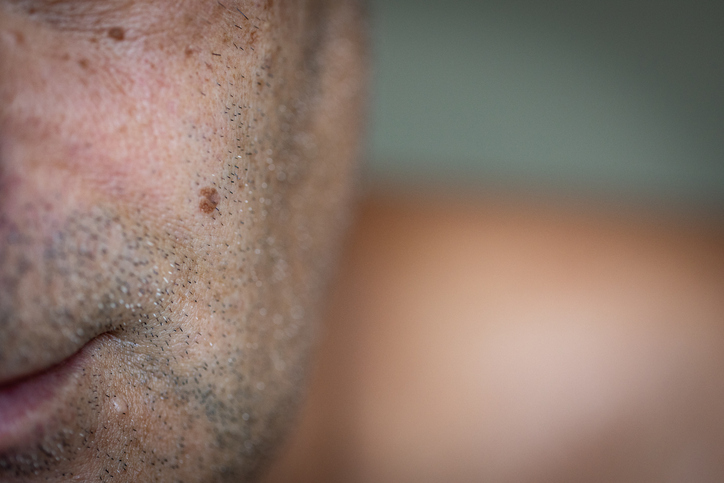Skin cancer can be confusing…
Firstly, any type of skin cancer is concerning. That’s why it’s important to pay attention to your skin and see a dermatologist at least once a year to see if any moles, freckles or growths are of concern.
But some skin cancers have a much higher degree of risk for metastasizing, like melanoma. While melanoma is rare, accounting for only 1 percent of skin cancer cases, it represents the majority of skin cancer deaths.
Then there are non-melanoma skin cancers, like basal cell carcinomas (BCC) and squamous cell carcinomas (SCC), the two most common types of skin cancer.
Both are slow-growing and usually appear in places where you would notice them, like anywhere on the face or head, neck or back of hands.
For these two kinds of skin cancers, there’s good news in the form of a vitamin that could reduce your risk of getting one — and experiencing a recurrence, which they are notorious for…
Disfigurement, painful growths, sores and scars
BCC accounts for about 8 in 10 skin cancers, while SCC accounts for roughly 2 in 10. Fortunately, most non-melanoma skin cancers don’t spread to other parts of the body and death from these cancers is rare.
But if left untreated, both BCC and SCC are capable of growing into cartilage, bone and other nearby tissues. Rarely, SCC, more so than BCC, may reach lymph nodes.
Generally, however, scaly patches on the skin, bleeding sores, painful growths (that can become quite large if not removed) and disfigurement are what one can expect from these two — as well as a high chance of recurrence.
And if you’ve never had to undergo Mohs surgery, which involves cutting away thin layers of skin to get every last cancerous cell at its deepest level, I can attest, it’s not something you’d ever want to go through again. So, keeping them from coming back would be a godsend.
That’s why the idea of a simple vitamin as prevention is a big relief for many…
Nicotinamide: your skin’s guardian
Previously, in 2015, Australian researchers conducted a clinical trial that showed nicotinamide — a form of vitamin B3 — could reduce the risk of non-melanoma skin cancer by 23% in people at a high risk. It literally just took two pills a day to keep skin cancer away.
Researchers believe nicotinamide has this effect on skin cancer because it reduces or reverses the DNA damage, inflammation and the suppression of the immune system caused by UV rays from the sun.
But new research sought to validate those findings, both in a larger study group and with a control group. Since B3 is available over the counter, they needed to determine who was taking the vitamin and who was not.
To do that, researchers from Vanderbilt University Medical Center used data from the Veterans Affairs Corporate Data Warehouse. They were able to check the outcomes of 33,833 patients for their next skin cancer diagnosis following baseline treatment with 500 milligrams of nicotinamide twice daily for longer than 30 days.
The researchers compared 12,287 patients who received the treatment with 21,479 who did not. Here’s what they saw:
- Across the board, there was a 14% reduction in the risk of skin cancer.
- When nicotinamide was taken after a first skin cancer, the risk reduction rose to 54%. However, with subsequent skin cancers, the benefit declined.
- The risk reduction was much larger for squamous cell carcinoma (BCC).
That makes two studies now that give vitamin B3, Nicotinamide, a thumbs up in the fight against non-melanoma skin cancers.
Nicotinamide versus niacin (both versions of B3)
If you go looking for nicotinamide in the store, you may see some vitamin B3 supplements labeled as niacin. Niacin is the crystallized form of B3, whereas nicotinamide is a water-soluble form. Be sure to get the latter, which is what was used in the study.
People in the study took 500 mg of nicotinamide two times per day, so you’ll likely want to take a similar dosage.
You are at highest risk for non-melanoma skin cancers if you have fair skin, light hair (red or blond), light eyes (green, blue or gray) and freckle easily.
And guys, pay attention: men are also more likely to get non-melanoma skin cancer than women.
If you stop taking the vitamin, your risks for skin cancer will go back to where they were. Even when taking nicotinamide, be cautious about spending too much time in the sun. It’s still important to wear hats, proper clothing to protect arms and legs, and use safe sunscreen formulations. Also, avoid tanning beds.
If you also have concerns about melanoma, you should read about the vitamin that can halve the risk of that deadly cancer.
Sources:
Study reveals efficacy of nicotinamide for skin cancer prevention – EurekAlert!
The lowdown on skin cancer: Types, treatment and staying safe — Easy Health Options
Types of non-melanoma skin cancer — Canadian Cancer Society
Read full article here


